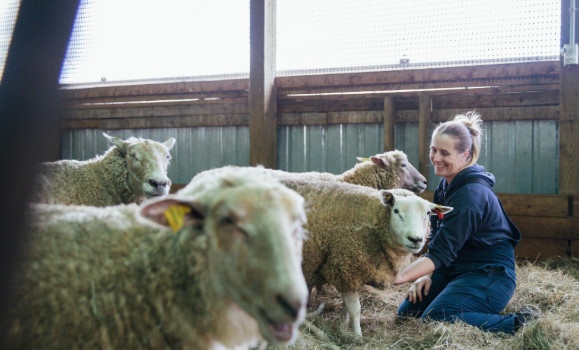News
» Go to news mainA Standard of Care and Excellence

As the only Agricultural Campus in the country with a working on-site farm, significant opportunities and resources are provided to faculty, staff, and students in the areas of teaching, research and extracurricular activities.
The Farm complex serves the needs of the Faculty of Agriculture and includes active animal production systems in dairy, poultry (broiler, layer, and turkey), sheep, mink and aquaculture.
Each animal unit adheres to specific and relevant animal welfare codes and standards of practice and researchers, staff and students are dedicated to animal welfare and the sustainability of animal agriculture.
“The staff deeply care for the animals, and this is incorporated into the way they work,” explained university veterinarian Dr. Chris Harvey-Clark. “They then mentor students in the same way. The practice of stockmanship on the agricultural campus is second to none,” he added.Â
By using good stockmanship practices animal care is improved and safety for people and animals is also improved.
Commitment to Animal Welfare
Animal welfare seeks to improve the expression of natural behaviours and the physical and mental well-being of animals managed by humans.
A Certificate in Animal Welfare available on the Truro campus aims to help students gain specialized knowledge on the well-being of animals managed ethically by humans. The certificate provides a range of theory, evaluation of scientific literature, and its application surrounding the use of animals. The program prepares students for careers in animal health and welfare by giving them expertise specific to this field.
A student Code of Conduct and Animal Welfare Commitment also ensures students are directly responsible for the animals with which they are in contact. Â Â
“I want students who complete the Certificate in Animal Welfare to develop an interdisciplinary awareness on the ethics of animal use and develop the skills required to assess welfare issues objectively in a scientifically credible manner,” said Dr. Miriam Gordon, animal science instructor.
Animal Care and Practices
All those involved in the care of animals on the Agricultural Campus follow standards of care provided by various organizations including the Canadian Council on Animal Care (CCAC) and the National Farm Animal Care Council (NFACC). The NFACC is the only organization in the world that brings together animal welfare groups, enforcement, government, and farmers under a collective decision-making model for advancing farm animal welfare.  The NFAAC provides an animal care assessment framework for which species-specific industry animal care assessment programs are based on.
A new development in Canada in the past year has been a new code of practice published, For the care and handling of farmed salmonids by the NFACC. This updates many of the welfare standards for salmonid fish, specifically, but can be applied to other species too. Dr. Jim Duston was part of the Farmed Salmonids Code of Practice Scientific Committee and Dr. Chris Harvey-Clark was a Code Development Committee Member.
Dr. Chris Harvey-Clark and Dr. Jim Duston, Professor, Finfish Aquaculture are members of the NFACC, and Dr. Harvey-Clark is working with the CCAC to update and replace their codes.
Current Research
Current research being undertaken by Dr. Rebecca Meagher, assistant professor in Animal Welfare, includes a mink project identifying optimal environments for long-term welfare and behavioural development of kits and a dairy project to help understand the natural behaviour and stress response of newborn dairy calves. The goal of her work is to improve methods of welfare assessment, and determine what stimuli need to be provided to animals to improve well-being on farms.
“I think research like this is important because we have a responsibility to manage animals in the best way we can when they’re under our care,” says Meagher. “This is about making farms more efficient by getting rid of some of the welfare problems that can inhibit production, but it's also about the social sustainability of the industry and developing farming systems that everyone in society is more comfortable with.”
Dr. Meagher also participated on the committee for mink code revision completed in 2021.Â
Facility renewal
To support essential research on campus and to educate the future leaders of this industry, constant renewal of the farm complex is essential and an ongoing priority for the university.
Continual upgrades are being made in areas of animal comfort and to mimic a more natural habitat including bedded pack pens for transition cows to reduce stress during calving, sand pens for rehabilitation, plans for colony cages in poultry, condo pens in mink, environmental enrichment for poultry and mink, redistributing warm water from the plate cooler to cows for drinking and more. Â
Future development plans could include a precision animal management centre and a sustainable digital aquaculture centre which would see new facilities and the latest industry technologies designed to support research, development and teaching that reflects industry realities and aspirations.
“We are always practicing excellent animal husbandry on our campus with intentions of being a regional centre of excellence for the industry,” explained Dean Dr. David Gray. “Constant renewal of facilities is a priority not only for our animals and our research, but for the education of our students who will be helping to sustain an industry on the precipice of exponential growth.”
Recent News
- Engineering Excellence: Students triumph at Atlantic competition, earn National silver
- Dal AC International expands global learning with GSO funding
- Engaging with the African Nova Scotian Community
- The Dal AC International Guest House is Now Open!
- Finding Balance and Success in Engineering and Athletics
- International conference on Canadian agri‑food & rural advisory, extension and education
- BCDI Canadian International Development Scholarships
- Dal student places second at Innovation Challenge
